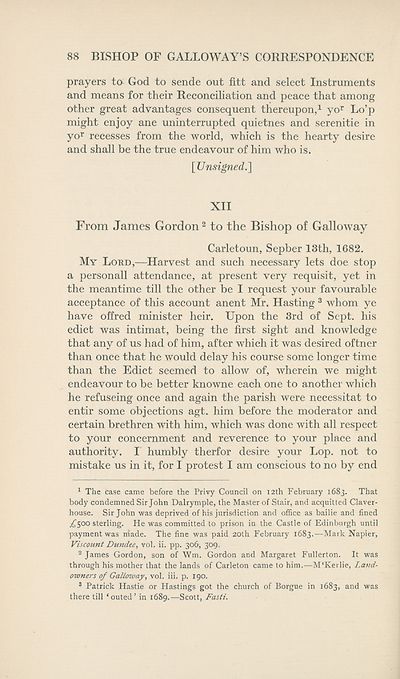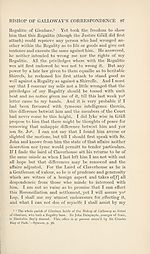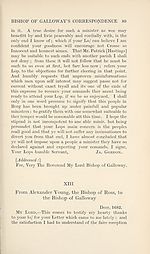Series 2 > Miscellany of the Scottish History Society
(105) Page 88
Download files
Complete book:
Individual page:
Thumbnail gallery: Grid view | List view

88 BISHOP OF GALLOWAY’S CORRESPONDENCE
prayers to God to sende out fitt and select Instruments
and means for their Reconciliation and peace that among
other great advantages consequent thereupon,1 yor Lo’p
might enjoy ane uninterrupted quietnes and serenitie in
yor recesses from the world, which is the hearty desire
and shall be the true endeavour of him who is.
[Unsigned.]
XII
From James Gordon2 to the Bishop of Galloway
Carletoun, Sepber 13th, 1682.
My Lord,—Harvest and such necessary lets doe stop
a personall attendance, at present very requisit, yet in
the meantime till the other be I request your favourable
acceptance of this account anent Mr. Hasting 3 whom ye
have offred minister heir. Upon the 3rd of Sept, his
edict was intimat, being the first sight and knowledge
that any of us had of him, after which it was desired oftner
than once that he would delay his course some longer time
than the Edict seemed to allow of, wherein we might
endeavour to be better knowne each one to another which
he refuseing once and again the parish were necessitat to
entir some objections agt. him before the moderator and
certain brethren with him, which was done with all respect
to your concernment and reverence to your place and
authority. I humbly therfor desire your Lop. not to
mistake us in it, for I protest I am conscious to no by end
1 The case came before the Privy Council on 12th February 1683. That
body condemned Sir John Dalrymple, the Master of Stair, and acquitted Claver-
house. Sir John was deprived of his jurisdiction and office as bailie and fined
^500 sterling. He was committed to prison in the Castle of Edinburgh until
payment was made. The fine was paid 20th February 1683.—Mark Napier,
Viscount Dundee, vol. ii. pp. 306, 309.
2 James Gordon, son of Wm. Gordon and Margaret Fullerton. It was
through his mother that the lands of Carleton came to him.—M'Kerlie, Land¬
owners of Galloway, vol. iii. p. 190.
s Patrick Hastie or Hastings got the church of Borgue in 1683, and was
there till ‘outed’ in 1689.—Scott, Fasti.
prayers to God to sende out fitt and select Instruments
and means for their Reconciliation and peace that among
other great advantages consequent thereupon,1 yor Lo’p
might enjoy ane uninterrupted quietnes and serenitie in
yor recesses from the world, which is the hearty desire
and shall be the true endeavour of him who is.
[Unsigned.]
XII
From James Gordon2 to the Bishop of Galloway
Carletoun, Sepber 13th, 1682.
My Lord,—Harvest and such necessary lets doe stop
a personall attendance, at present very requisit, yet in
the meantime till the other be I request your favourable
acceptance of this account anent Mr. Hasting 3 whom ye
have offred minister heir. Upon the 3rd of Sept, his
edict was intimat, being the first sight and knowledge
that any of us had of him, after which it was desired oftner
than once that he would delay his course some longer time
than the Edict seemed to allow of, wherein we might
endeavour to be better knowne each one to another which
he refuseing once and again the parish were necessitat to
entir some objections agt. him before the moderator and
certain brethren with him, which was done with all respect
to your concernment and reverence to your place and
authority. I humbly therfor desire your Lop. not to
mistake us in it, for I protest I am conscious to no by end
1 The case came before the Privy Council on 12th February 1683. That
body condemned Sir John Dalrymple, the Master of Stair, and acquitted Claver-
house. Sir John was deprived of his jurisdiction and office as bailie and fined
^500 sterling. He was committed to prison in the Castle of Edinburgh until
payment was made. The fine was paid 20th February 1683.—Mark Napier,
Viscount Dundee, vol. ii. pp. 306, 309.
2 James Gordon, son of Wm. Gordon and Margaret Fullerton. It was
through his mother that the lands of Carleton came to him.—M'Kerlie, Land¬
owners of Galloway, vol. iii. p. 190.
s Patrick Hastie or Hastings got the church of Borgue in 1683, and was
there till ‘outed’ in 1689.—Scott, Fasti.
Set display mode to:
![]() Universal Viewer |
Universal Viewer | ![]() Mirador |
Large image | Transcription
Mirador |
Large image | Transcription
Images and transcriptions on this page, including medium image downloads, may be used under the Creative Commons Attribution 4.0 International Licence unless otherwise stated. ![]()
| Scottish History Society volumes > Series 2 > Miscellany of the Scottish History Society > (105) Page 88 |
|---|
| Permanent URL | https://digital.nls.uk/127192665 |
|---|
| Attribution and copyright: |
|
|---|
| Description | Over 180 volumes, published by the Scottish History Society, containing original sources on Scotland's history and people. With a wide range of subjects, the books collectively cover all periods from the 12th to 20th centuries, and reflect changing trends in Scottish history. Sources are accompanied by scholarly interpretation, references and bibliographies. Volumes are usually published annually, and more digitised volumes will be added as they become available. |
|---|


